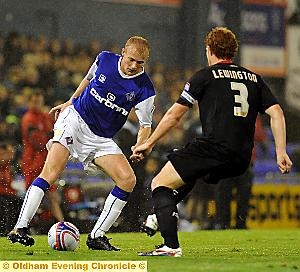Jump to it!
Reporter: MATTHEW CHAMBERS
Date published: 29 November 2011

Robbie Simpson: understandably annoyed that his goal didn’t stand
Technology would end all goal-line spats
BACK IN the days when school fields hadn’t all been turned into housing estates, many a pleasant summer’s evening was spent playing football on hard-baked grass pitches.
At that time of year, proper markings were a memory and goal posts had been removed — always a mystery, that one — until term started again in September.
Other than deciding whose turn it was to do the ice-pops run, or who had to leg it home to get a replacement ball after the original had been belted on to the roof, the main argument was always the same. Was it a goal, or wasn’t it?
Differences of opinion back then were usually resolved in accordance with who was doing the appealing.
Even if the ball had clearly drifted over the outer section of the jumper thrown on the ground to mark a goal post, if the biggest lad said it was a goal then it was always going to stand.
There were no referees on hand and no cameramen helping provide instant replays as contrary evidence.
Robbie Simpson can hardly be cast as the school bully in attempting to claim his strike against Bournemouth on Saturday had crossed the goal-line at Dean Court.
The forward was completely convinced he had scored a legitimate goal, even turning away to celebrate. But referee Andy D’Urso felt distinctly less sure and waved play on.
Thousands of Bournemouth supporters stationed directly behind the incident knew full-well Simpson’s effort should have been allowed to stand; tweets and texts flowed at half-time saying so.
With no recourse to televised replays and no other technological or human assistance available in aiding D’Urso, though, Athletic were left as disappointed as the kid with stunted growth in the park who felt certain he had deflected the big lad’s shot away for a corner.
A war of words between two physically mismatched children is one thing. An outcome in professional sport that goes against clear evidence seen by thousands, both at the time and also afterwards via television, is quite another.
FIFA apparently believes that human error is an important facet of the sport. Certainly, the governing body does its best to practise what it preaches, electing a buffoon as president and holding a forthcoming World Cup in a desert.
But everyone in football — not least referees — deserves better than to allow the status quo to remain.
New technology may play its part. Even if it takes a few seconds to look at a monitor, or if it means throwing a few quid the way of extra officials to stand behind the goal, a delayed verdict on such a pivotal moment is better than an unjust one.
Football already has natural breaks in play: half-time, substitutions, the retrieval of footballs kicked out of play, referees issuing cards, players being treated for injuries.
Will an extra 30 seconds to decide on the legitimacy of a goal really take anything away from the game?
Other sports manage to find solutions to help match officials in the middle. If professional football doesn’t put an end the current farce, quickly, we might as well all pick up our jumpers and go home.
Most Viewed News Stories
- 1The Oldhamers handed awards in King’s New Year’s Honours List
- 2You can score free tickets to a Latics game while supporting Dr Kershaw’s Hospice
- 3Public inquiry announced into rail upgrade that could leave villages ‘cut off’ for months
- 4Primary school in Uppermill considers introducing new ‘faith-based’ entry criteria to tackle...
- 5Tributes paid following death of hugely respected Oldham community figure Dale Harris




